Colorado Marriage Laws: Crucial Details for Couples 2024
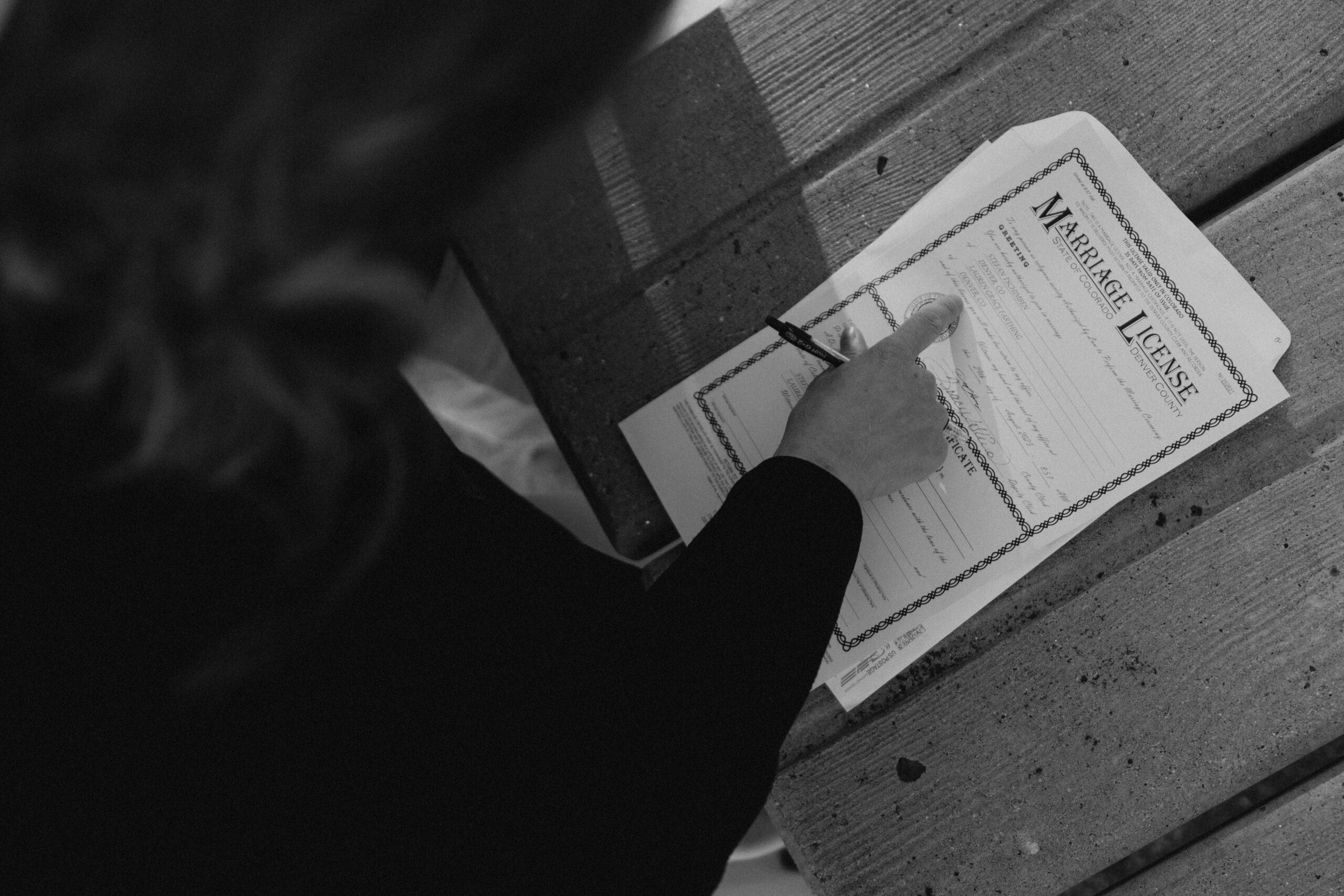
In Colorado, the sky isn’t the only spacious wonder—so is the process of marriage. Much like an open meadow welcomes the mountain breeze, Colorado invites couples to unite with minimal legal obstruction:
Understanding the simplicity of Colorado marriage laws is crucial before vows are uttered amidst the Rockies.
Effective January 1, 2023, Colorado marriage law champions autonomy in matrimony, granting couples the liberty to self-solemnize without an officiant’s presence.
Table of Contents
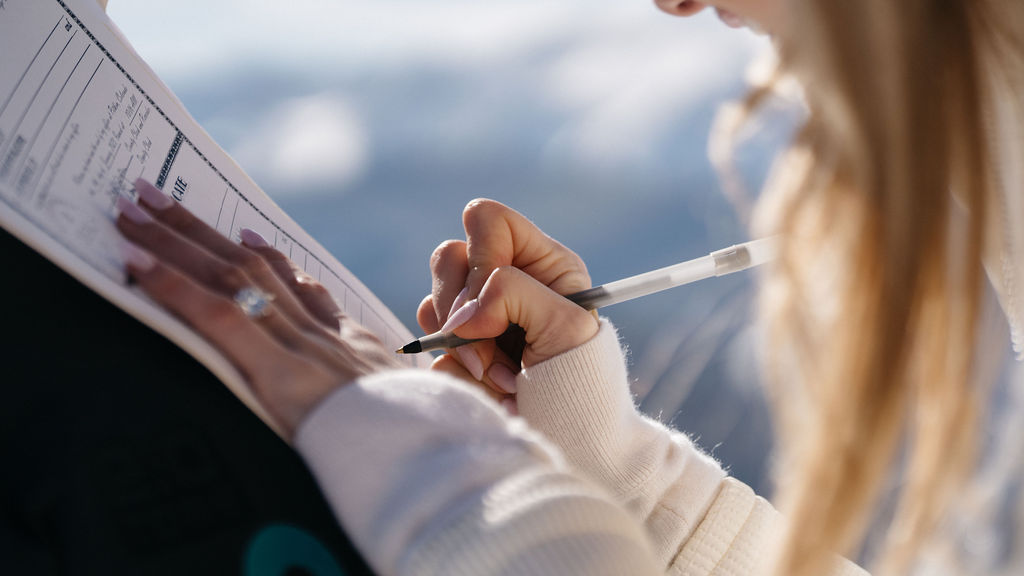
Eligibility Requirements for Marriage in Colorado
In Colorado, individuals must be at least 18 years of age to marry without parental consent. This age requirement is staunchly upheld to ensure legal capacity and autonomy in entering the marital contract.
Should either party be aged 16 or 17, parental or guardian consent, coupled with judicial approval, must be secured to validate the marriage. These provisions are designed to protect minors while allowing for lawful exceptions under controlled circumstances.
No person under the age of 16 is permitted to marry in Colorado, affirming the state’s commitment to the welfare and protection of its youth.
Age Restrictions and Consent – Colorado Marriage law
In Colorado, the minimum age to marry independently is 18—upholding autonomy and legal capacity in contractual matrimony.
Colorado’s marriage laws exalt independence, allowing those 18 and older to marry without exterior consent or affirmation.
Parties aged 16 or 17 can still marry, but require parental or guardian consent and judicial approval, embodying a balanced approach to youthful matrimony.
Marital statutes unequivocally prohibit marriage under 16, preserving youth welfare while underscoring the state’s protective legal framework.
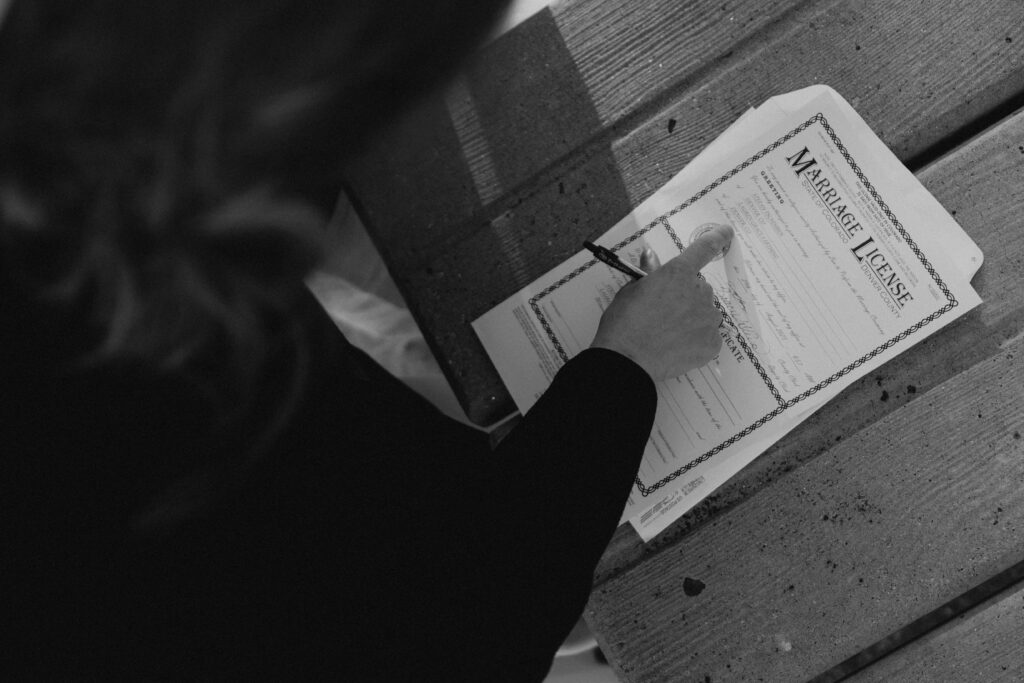
Couples’ Relationship Criteria
In Colorado, there are no formal residency requirements for marriage, ensuring that both residents and visitors can marry within the state with equal standing. The absence of a stipulated residency period provides flexibility for couples planning an elopement to Colorado’s stunning landscapes.
Couples must consent to the union of their own free will, a fundamental marriage prerequisite.
The state recognizes all lawful marriages regardless of the couple’s gender, upholding equality and inclusivity in the recognition of matrimonial bonds.
To secure a marriage license, applicants must provide proof of age, typically in the form of a government-issued ID, ensuring that all parties meet the state’s age criteria.
The law mandates that marriage is entered into with complete volition and mutual consent, safeguarding the integrity and personal freedom within the matrimonial contract.
Finally, both parties must not be related to a degree that is considered illegal under Colorado’s marriage codes, maintaining ethical boundaries in family relations.
Legal Documentation Needed
In Colorado, marriage license acquisition necessitates valid identification, such as a driver’s license, passport, or state-issued identification card. Birth certificates, social security numbers, and if applicable, proof of the termination of previous marriages, such as divorce decrees or death certificates, are also compulsory. These documents substantiate the eligibility of each party to enter into the contract of marriage as per state law. You can find this document here.
It’s imperative to recognize that Colorado does not require blood tests or witnesses, thereby simplifying the process. However, the license must be signed by the officiant and returned within a specified period after the ceremony to officially validate the marital union.
Identification and Proof of Age
To formalize your intention to marry in Colorado, both parties must present a government-issued photo ID.
- Driver’s License or Instruction Permit.
- Passport or a Passport Card.
- State Identification Card or a Military Identification Card.
- Birth Certificate, accompanied by a photo ID if not present on the certificate.
These credentials confirm your legal name and age and that you meet the state’s minimum age requirement of 18.
If either party is under 18, additional stipulations apply, including consent and potential court approval.
In such circumstances, ensuring proper compliance with Colorado marriage law is essential, as it upholds the legal assumption of maturity necessary for entering into a binding contract.
Previous Marriages Documentation
Should either party have been previously married, the state of Colorado requires evidence of the dissolution of the last marriage.
In Colorado, individuals who have been previously married are mandated to provide documentation proving that the marriage has legally ended. This could be a certified copy of the divorce decree, a certificate of annulment, or a death certificate in the case of a deceased spouse. The pertinent document must unambiguously state the resolution of the marriage and must be presented when applying for a marriage license. Failure to furnish appropriate documentation can impede the marriage licensing process.
It’s imperative to note that there is no waiting period following a divorce in Colorado; one may apply for a marriage license immediately following the finalization of the previous divorce decree. However, you must ensure complete accuracy in the dissolution dates when completing the marriage license application, as any discrepant information could call into question the legality of the license itself.
For those remarrying, it’s essential to accurately convey any changes in legal surname on the marriage license application, if the name is different from the name on the provided previous marriage documentation. This helps preclude any potential legal ambiguities that might arise. Additionally, individuals should be prepared to provide the full names of their previous spouses and the exact date and location of the marriage’s dissolution. Accurate recordation demonstrates compliance with Colorado’s statutes and establishes a precise legal foundation for future marital records.
The Colorado Marriage License Process
The first step in embarking on a matrimonial journey in Colorado is obtaining a marriage license. This indispensable document legally sanctioned your union, provided both parties fulfill the state’s requirements.
The law dictates that couples must arrive at a county clerk’s office to procure their license. Essential identification documents, such as driver’s licenses or passports, alongside the payment of a nominal fee, will be mandated. Absent extenuating circumstances, the couple must be together when submitting their application.
Colorado’s distinct “self-solemnization” option obviates the need for an officiant. Couples can legally enact their nuptials privately, granting them a unique latitude in personalizing their elopement ceremonies.
License Application Steps
In Colorado, obtaining a marriage license involves visiting a county clerk’s office with your partner.
- Bring valid identification such as a driver’s license, passport, or state-issued ID card.
- Fill out the marriage license application provided by the county clerk.
- Be prepared to pay the license fee, which is subject to vary by county.
- Some counties may require a Social Security number if you have one.
- Licenses are typically issued on the spot and are valid immediately.
Ensure all information provided on the application is accurate and complete.
Once obtained, your marriage license will remain valid for 35 days, and it is imperative to solemnize your marriage within this window.
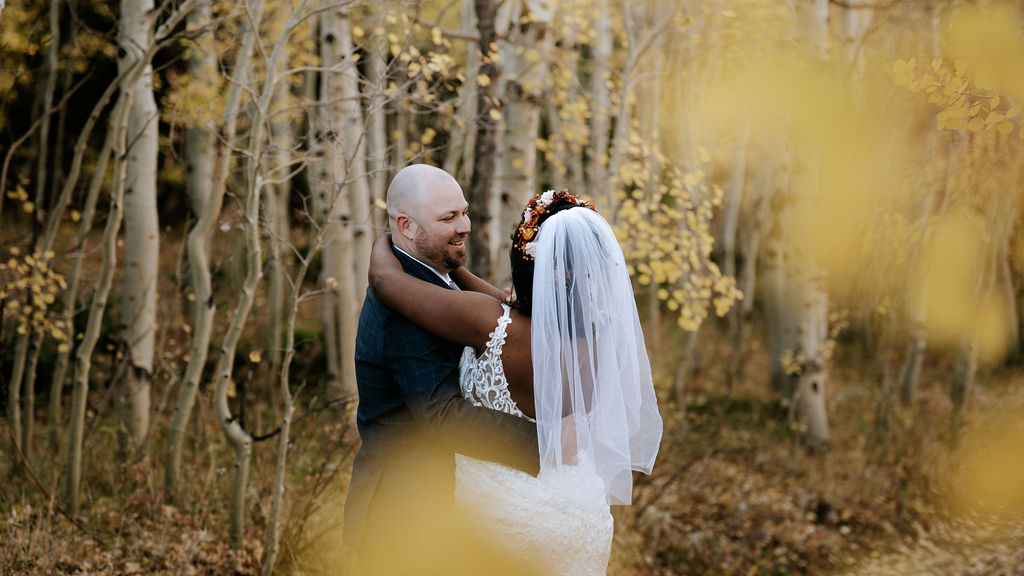
Fees and Waiting Periods
The marriage license fee in Colorado varies by county but generally ranges between $30 to $80.
There are no mandatory waiting periods after the license is issued.
Once you have your marriage license, you may marry immediately without delay—all that is required is a signature from each party, and, if you choose, a witness. Afterward, the license must simply be returned to the county’s office within 63 days.
In the event of any complications, such as a misplaced marriage license or unforeseen obstacles to meeting the solemnization timeframe, it is advisable to contact the issuing county clerk promptly. Doing so can mitigate further issues or delays, ensuring your nuptial timelines remain intact and allowing for any necessary corrective action to be taken.
Ceremony Essentials in Colorado
In the majestic state of Colorado, the simplicity of eloping is beautifully complemented by the naturally grand backdrops it offers. The ceremony itself does not require an officiant, giving you the extraordinary liberty to tailor your vows in any manner you see fit. This autonomy allows couples to imbue their exchange with personal significance, respectful of any cultural, spiritual, or individual preferences.
Eloping couples should be cognizant of specific site regulations when selecting a location, especially within national parks or public lands. Securing the requisite permits and adhering to environmental guidelines is paramount to ensure your celebration harmonizes with Colorado’s preserved beauty while acknowledging the jurisdiction’s commitment to conservation.
Who Can Officiate?
In Colorado, an officiant is not required to solemnize your marriage. You and your partner can self-solemnize, a unique option the state permits.
Friends or family members can officiate without any formal authorization.
For those desiring a more conventional ceremony, religious clergy members, judges, or other certified officiants may preside over the exchange of vows in line with their provided legal authority. Remember that formal officiants may require advance booking, which could come with associated costs.
In accordance with Colorado statutes, any public official authorized to take oaths, or in the alternative, tribal officials can legally bind your union. Should you choose to hire a professional celebrant or an officiant affiliated with a secular organization, ensure their credentials are legitimate and recognized by the state of Colorado to avoid potential validity issues with your marriage.
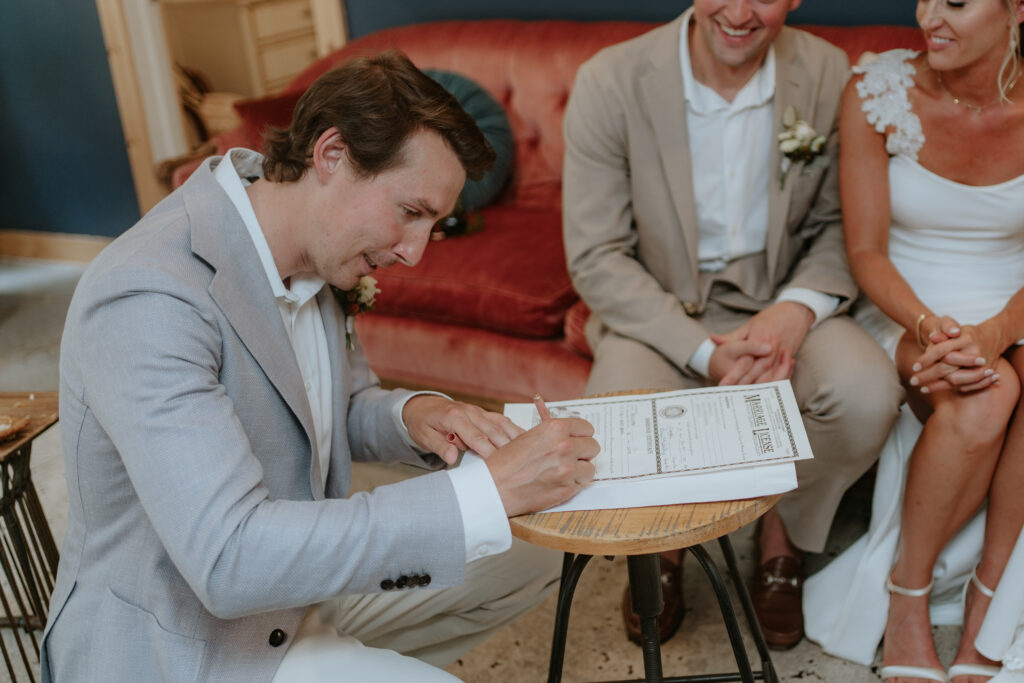
Witness Requirements and Ceremony Validity
Colorado marriage law is so simple, no witnesses are required at your marriage ceremony, an unusual provision compared to many other states. This affords a level of intimacy and privacy to your special moment, reflecting a progressive approach that honors couples’ preferences for their day.
This absence of witness necessity applies to all marriage ceremonies, irrespective of venue or officiant choice. Your union becomes valid upon executing the marriage license through mutual consent and subsequent signature.
However, although witnesses aren’t mandated by law for the ceremony, documentation remains a critical factor. A marriage license duly obtained from a County Clerk’s office (following submission of the requisite identification and payment of fees) must be completed and submitted.
Should you wish to incorporate witnesses as part of your ceremony, their presence is by no means invalidated. They can still play a traditional role, signifying their support and acknowledgment of your union, although their signatures are not mandated on your license.
The solemnization process, devoid of witness requirements, aligns well with Colorado’s self-solemnization option. Choosing to self-unite simplifies procedures, yet you must still adhere to the proper completion and timely return of the marriage license to confirm legal status.
Maintain awareness that the crux of ceremony validity lies in the proper execution and return of the marriage license. Ensure this document is filled out accurately, signed following the ceremony, and returned within the stipulated timeline to activate the full legality of your marital union.
Check out some of my other blog posts on where to say your vows in colorado.